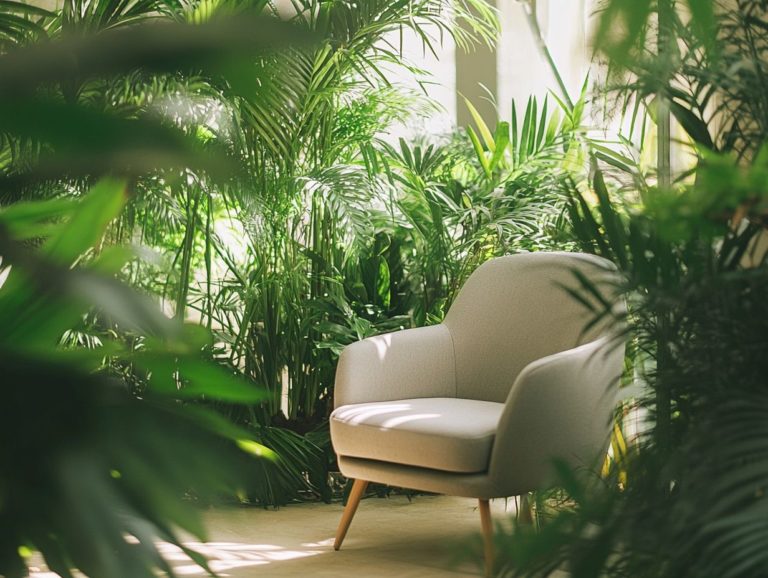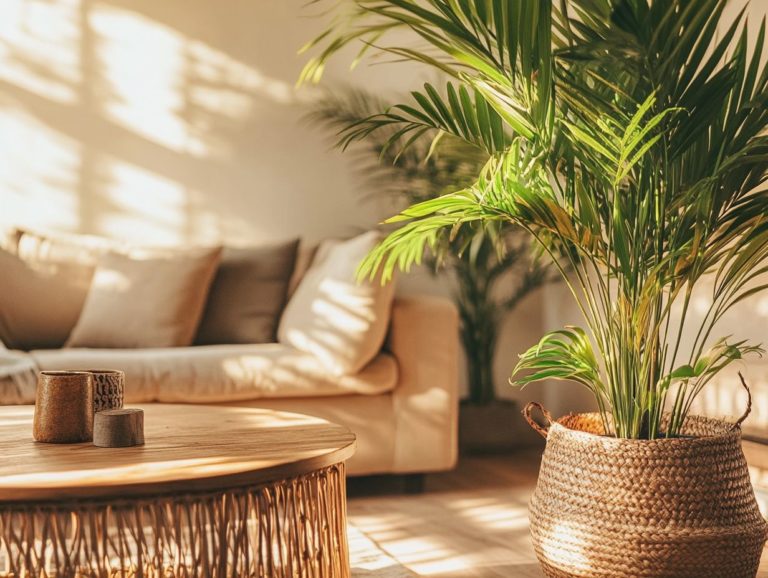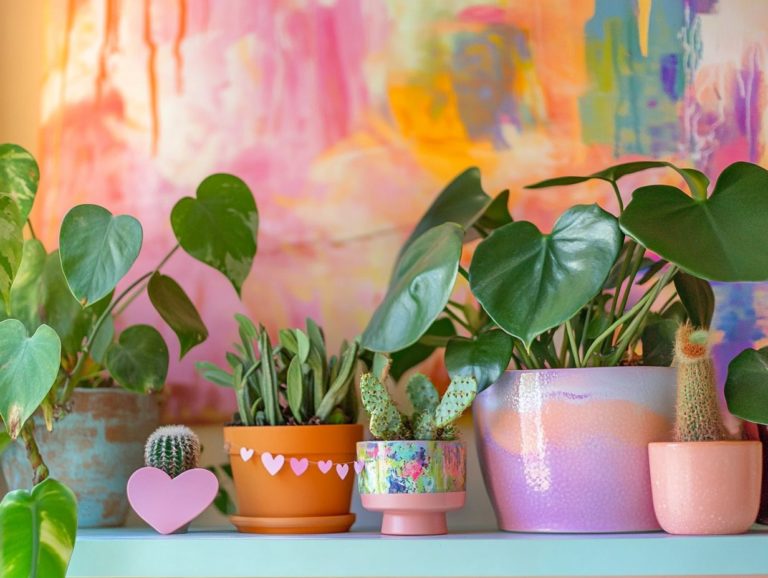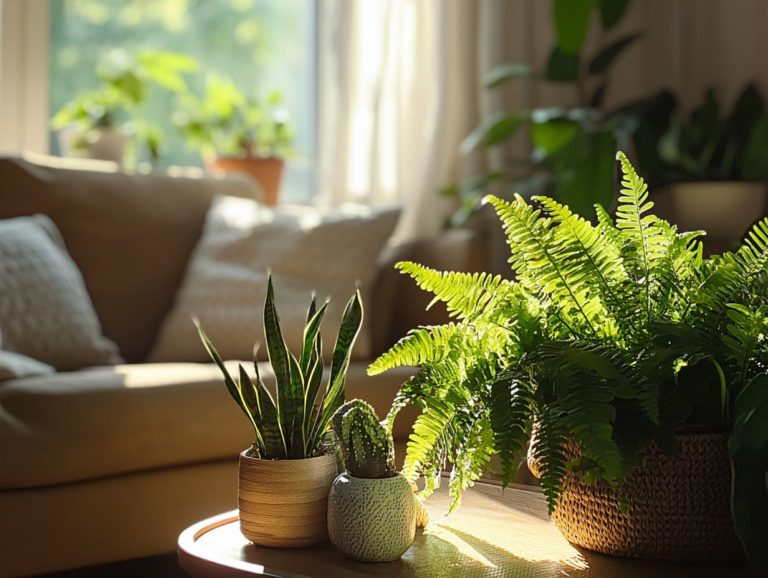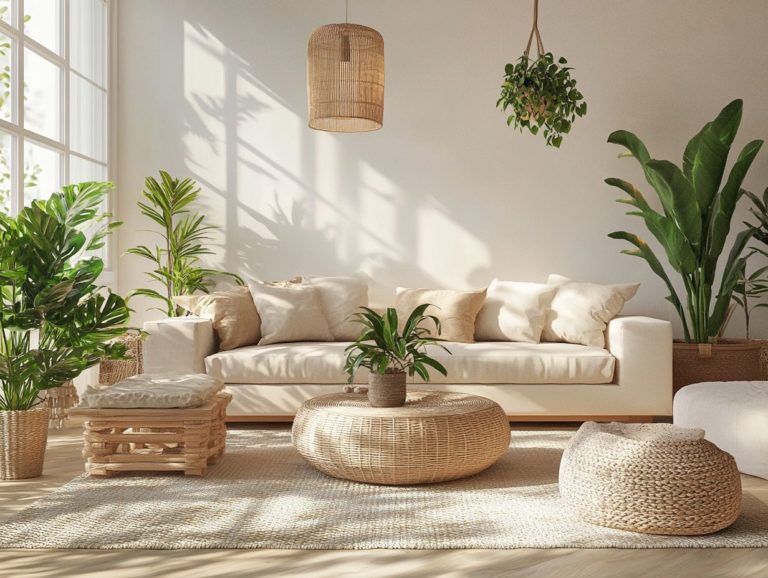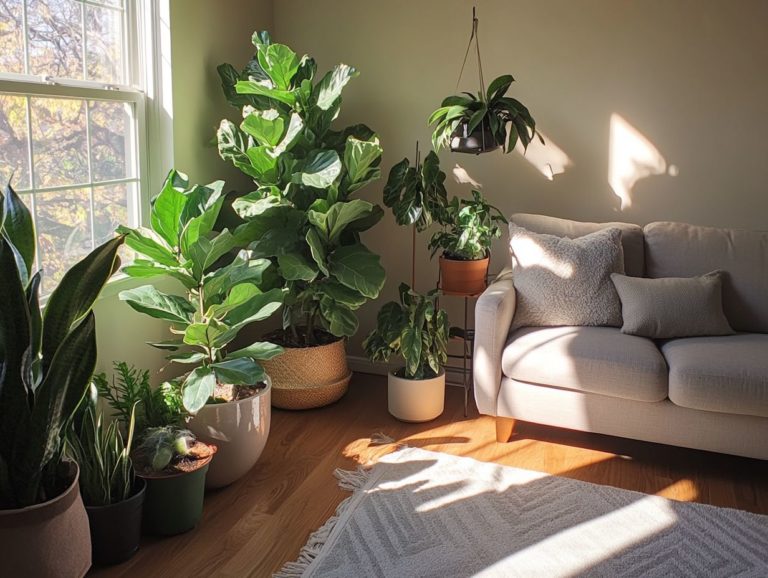Indoor Plants and Feng Shui: A Perfect Match
Indoor plants and Feng Shui come together to create a beautiful symphony that enhances the energy flow and balance in your space.
Delve into the essential principles of Feng Shui and uncover how the right selection of plants can truly transform your environment.
From choosing the perfect plants to designing an indoor garden that fosters tranquility, you’ll find practical tips and dispel common myths along the way.
Embrace the invigorating benefits of indoor greenery and transform your living space today!
Contents
- Key Takeaways:
- The Basics of Feng Shui
- Benefits of Indoor Plants in Feng Shui
- Choosing the Right Plants for Feng Shui
- Creating a Feng Shui Garden Indoors
- Caring for Indoor Plants in Feng Shui
- Feng Shui and Indoor Plant Myths
- Frequently Asked Questions
- Wondering how indoor plants boost Feng Shui?
- Curious about the best indoor plants for achieving good Feng Shui?
- How can I incorporate indoor plants into my Feng Shui design?
- Can indoor plants have a negative impact on Feng Shui?
- Are there specific care tips for indoor plants used in Feng Shui?
- Can I use artificial plants instead of real ones for Feng Shui purposes?
Key Takeaways:
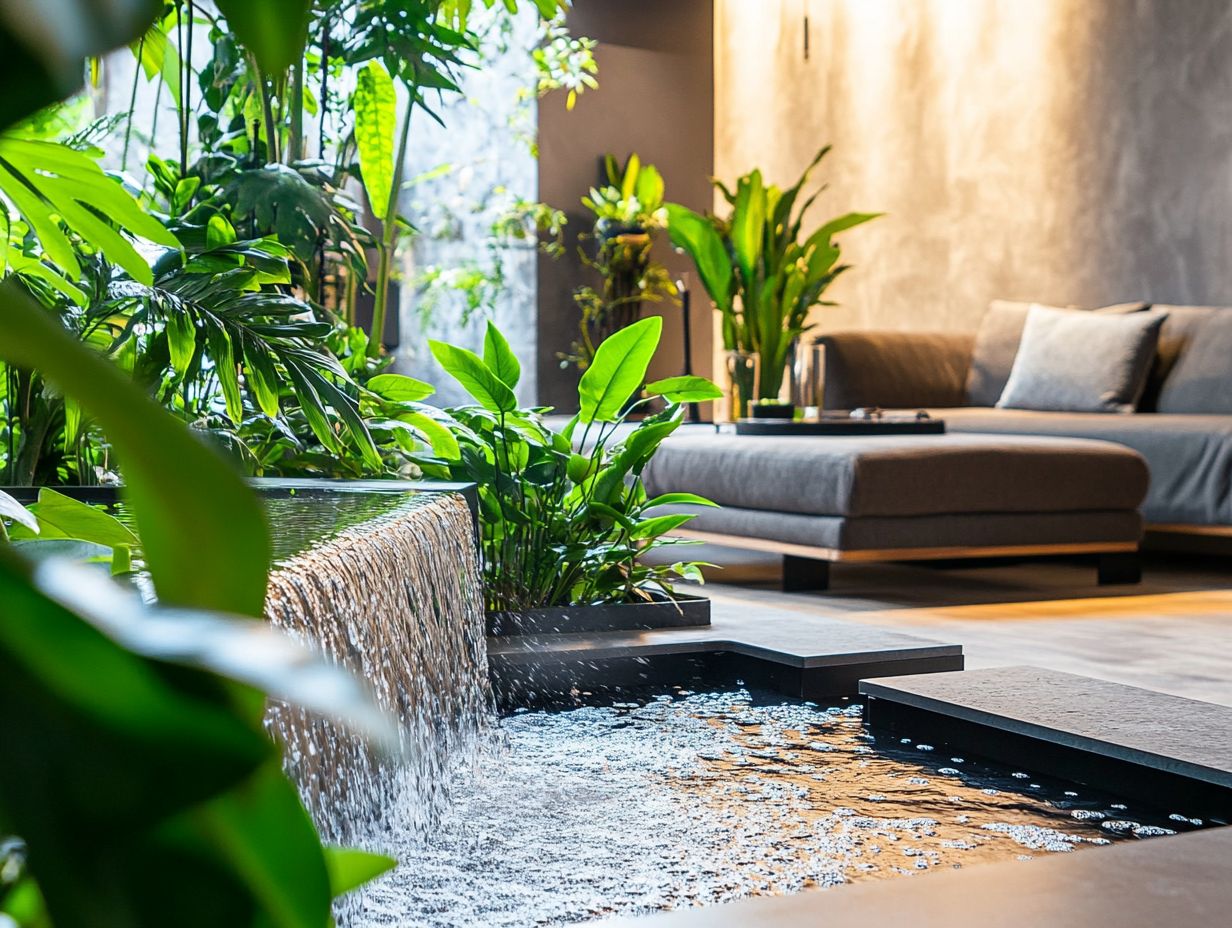
- Feng Shui principles promote balance and harmony in our surroundings.
- Indoor plants can significantly enhance the energy and balance in a space, according to Feng Shui beliefs.
- Choosing the right plants and properly caring for them can create a beautiful and harmonious Feng Shui garden indoors.
The Basics of Feng Shui
Feng Shui is an ancient Chinese art that emphasizes the thoughtful arrangement of your space to create good energy and elevate your living environment.
By grasping the principles of energy movement, you can design areas that nurture vibrant chi. This ultimately enhances your well-being and fosters harmony in your home.
This practice is rooted in the understanding that the way you arrange and select elements within your space can profoundly influence your quality of life and your emotional connection to your surroundings.
Understanding the Principles
Understanding the principles of Feng Shui means getting acquainted with the Bagua map, your critical tool for assessing energy flow in any space.
This map is divided into nine distinct areas. Each area relates to key aspects of life, such as wealth, relationships, and health.
By analyzing these sections, you can navigate your environment more effectively, fostering balance and harmony. For instance, you might discover that wealth-related energies can be amplified through the thoughtful placement of objects or colors in the corresponding area, while improving your relationships may require a few adjustments in another zone.
This interconnectedness of space and energy highlights the significance of mindful arrangement, giving you the power to enhance the vibrancy of your surroundings and cultivate positive outcomes in various areas of your life.
Benefits of Indoor Plants in Feng Shui
Integrating indoor plants into your home decor elevates aesthetic appeal. They also unlock a wealth of benefits associated with Feng Shui.
Introducing these natural elements promotes positive energy and enhances air quality, as houseplants act as natural air purifiers. They serve as vital forces that cultivate vibrant chi, nurturing emotional well-being and fostering a harmonious atmosphere throughout your home.
How Plants Enhance Energy and Balance
Plants hold a crucial role in enhancing the flow of energy and balance within your space. Healthy specimens can elevate vibrant chi and promote your emotional well-being.
Take the lively pothos, for example it s celebrated for its air-purifying abilities, effectively reducing toxins and creating a refreshing atmosphere in your surroundings. Then there s the calming presence of lavender, which not only delights your senses with its soothing fragrance but also encourages relaxation and restful sleep.
Bamboo, known for its resilience and strength, is believed to attract prosperity and positive energy, making it an ideal choice for any environment focused on growth and abundance.
Together, these plants demonstrate how diverse flora can harmonize energy and enhance overall vitality, fostering an atmosphere that supports your mental clarity and emotional balance.
Choosing the Right Plants for Feng Shui
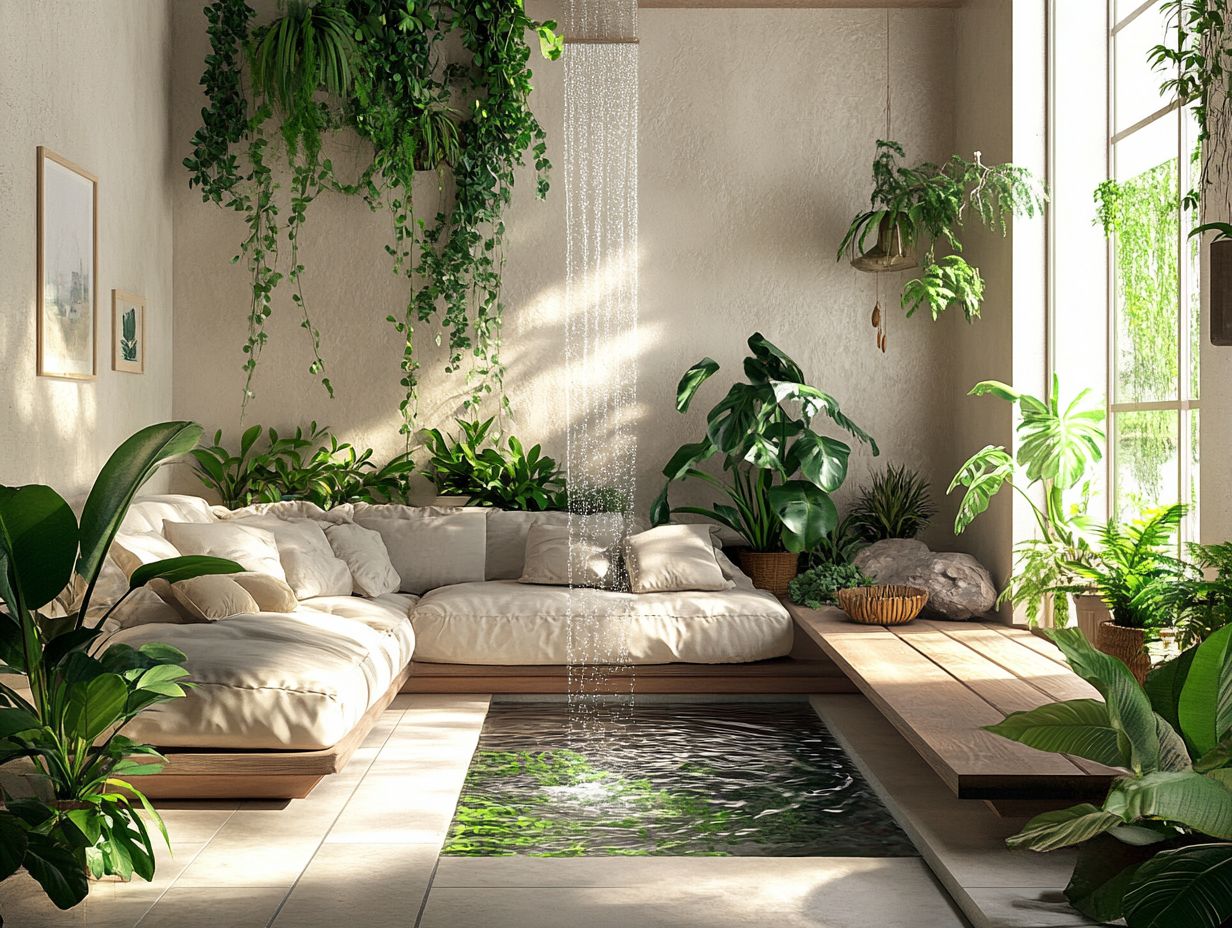
Selecting the finest Feng Shui plants means choosing species renowned for their positive energy and benefits. Consider the Money Tree, Jade Plant, Snake Plant, and Pothos; each of these contributes distinct attributes that can elevate your home environment, fostering growth and prosperity.
Embracing these plants not only enhances your space but also invites an atmosphere of abundance and harmony.
Start your journey to a harmonious home with these Feng Shui plants today!
Types of Plants and Placement
Understanding the types of indoor plants suitable for Feng Shui is essential. Their placement can significantly influence the wealth area, which represents financial prosperity, and the relationship area, focusing on love and partnerships, as well as the overall energy flow of your home.
Choose and arrange plants smartly for a lively atmosphere! Thoughtful selection of these natural elements creates an environment that nurtures prosperity, harmony, and well-being. For example, jade plants are often linked to financial growth, so placing them in the southeast corner of your living space can help stimulate wealth energy. Meanwhile, peace lilies can improve relationships when situated in the partnership area, which is typically the southwest corner of a room. Additionally, using indoor plants to create zen spaces can enhance the overall atmosphere of tranquility in your home.
The vibrant energy of snake plants, known for promoting health and vitality, flourishes best near entrances. They can welcome positive life energy into your home. By understanding these placements, you can align your living space with the principles of abundance and balance.
Creating a Feng Shui Garden Indoors
Creating a Feng Shui garden indoors calls for a deliberate approach. This harmonious fusion of design principles and attentive plant care not only cultivates an inviting atmosphere but also aligns beautifully with your home decor while promoting positive energy throughout.
Design Tips and Ideas
When designing an indoor Feng Shui garden, it s crucial to think about the visual appeal of your plants. Also consider their light requirements and maintenance needs.
Select plants that thrive in your home s light and bring calm energy. For example, in low-light areas, you might opt for snake plants or pothos both of which add greenery and require minimal care. If you have bright spaces, vibrant flowering plants like orchids or peace lilies can truly thrive in the sunlight.
To elevate your design, consider integrating decorative elements such as bamboo fountains or ceramic planters. These features can enhance balance and flow, transforming your space into a serene indoor oasis that promotes well-being and relaxation.
Caring for Indoor Plants in Feng Shui
Caring for your indoor plants in alignment with Feng Shui principles is crucial for keeping them healthy and vibrant. By paying attention to their maintenance needs, water requirements, and overall health, you nurture the plants and cultivate a space filled with positive energy in your home.
Maintenance and Tips for Longevity
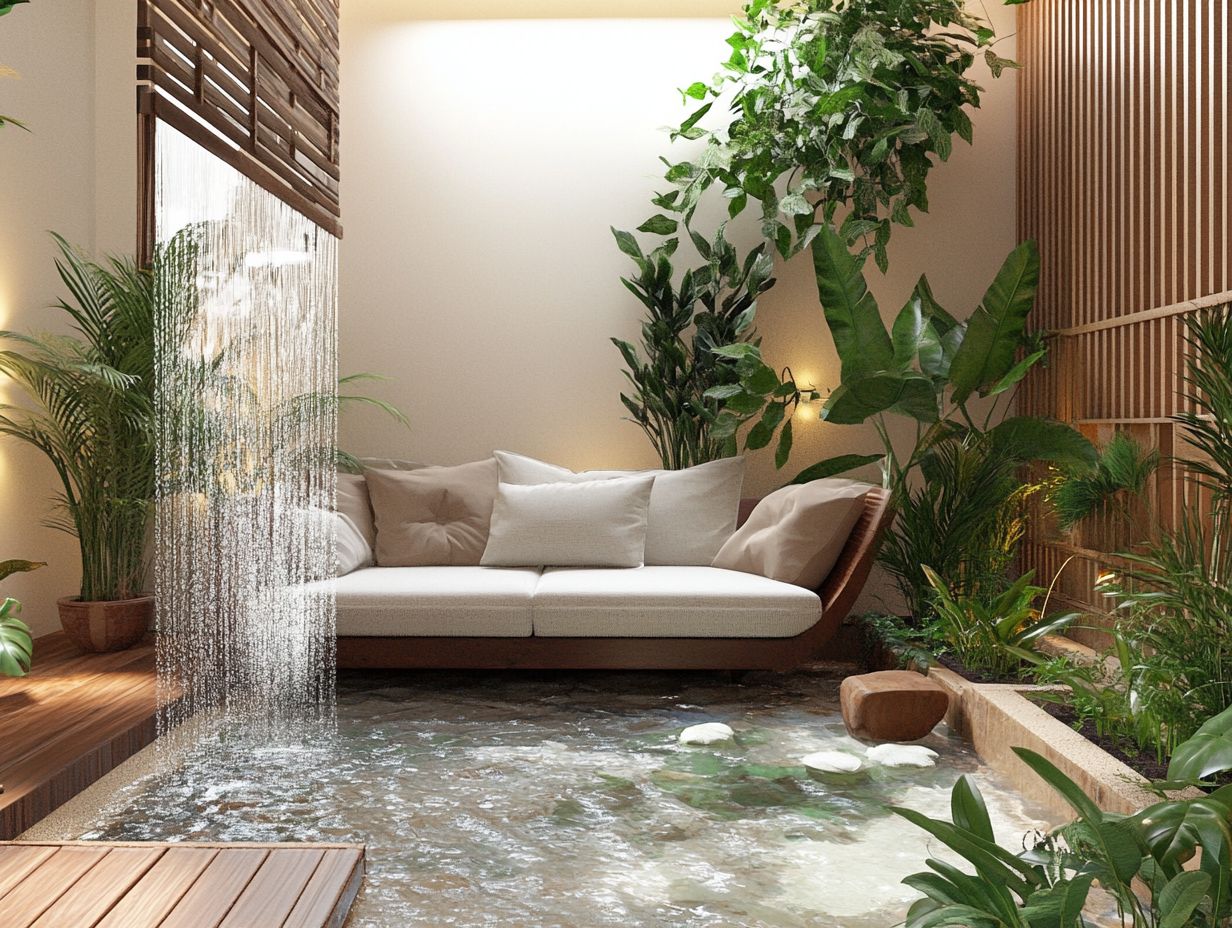
To ensure the longevity of your indoor plants, adhere to best practices in plant care that meet their specific maintenance needs and environmental conditions.
Understanding the unique requirements of each plant is vital. The ideal humidity level, typically between 40-60%, helps keep foliage vibrant and thriving. Maintaining a stable temperature ideally between 65 F and 75 F prevents unnecessary stress. Regularly inspecting for pests like spider mites and aphids allows you to catch infestations before they spiral out of control, enabling timely intervention. Opting for well-draining soil and the right fertilizers promotes healthy growth and boosts your plants’ resilience.
Engaging with your green companions daily cultivates a deeper connection. This attentiveness allows you to notice their changes, ultimately leading to a flourishing indoor garden. Share your plant journey with us!
Feng Shui and Indoor Plant Myths
Like any practice, Feng Shui is surrounded by a multitude of myths and misconceptions, particularly concerning indoor plants. These misunderstandings can obscure the genuine benefits and roles these plants play in enhancing your home environment.
Debunking Common Misconceptions
Debunking common misconceptions about Feng Shui uncovers the vital truth regarding indoor plants. They contribute significantly to the flow of positive energy and overall well-being.
Many people mistakenly assume that simply placing any indoor plant will magically enhance the energy of their living space. However, experts point out that not all plants share the same qualities or benefits.
For instance, while some plants may thrive in low-light conditions, others crave abundant sunlight to truly flourish and positively impact the environment. Certain plants, like bamboo and peace lilies, are considered lucky in Feng Shui; they symbolize good fortune and tranquility.
Grasping these nuances can empower you to create a harmonious atmosphere that nurtures both your spirit and your physical space.
Frequently Asked Questions
Wondering how indoor plants boost Feng Shui?
Indoor plants and Feng Shui have a strong connection as both focus on creating a balanced and harmonious environment. Plants represent growth, vitality, and positive energy, while Feng Shui is the practice of arranging your environment to enhance energy.
Curious about the best indoor plants for achieving good Feng Shui?
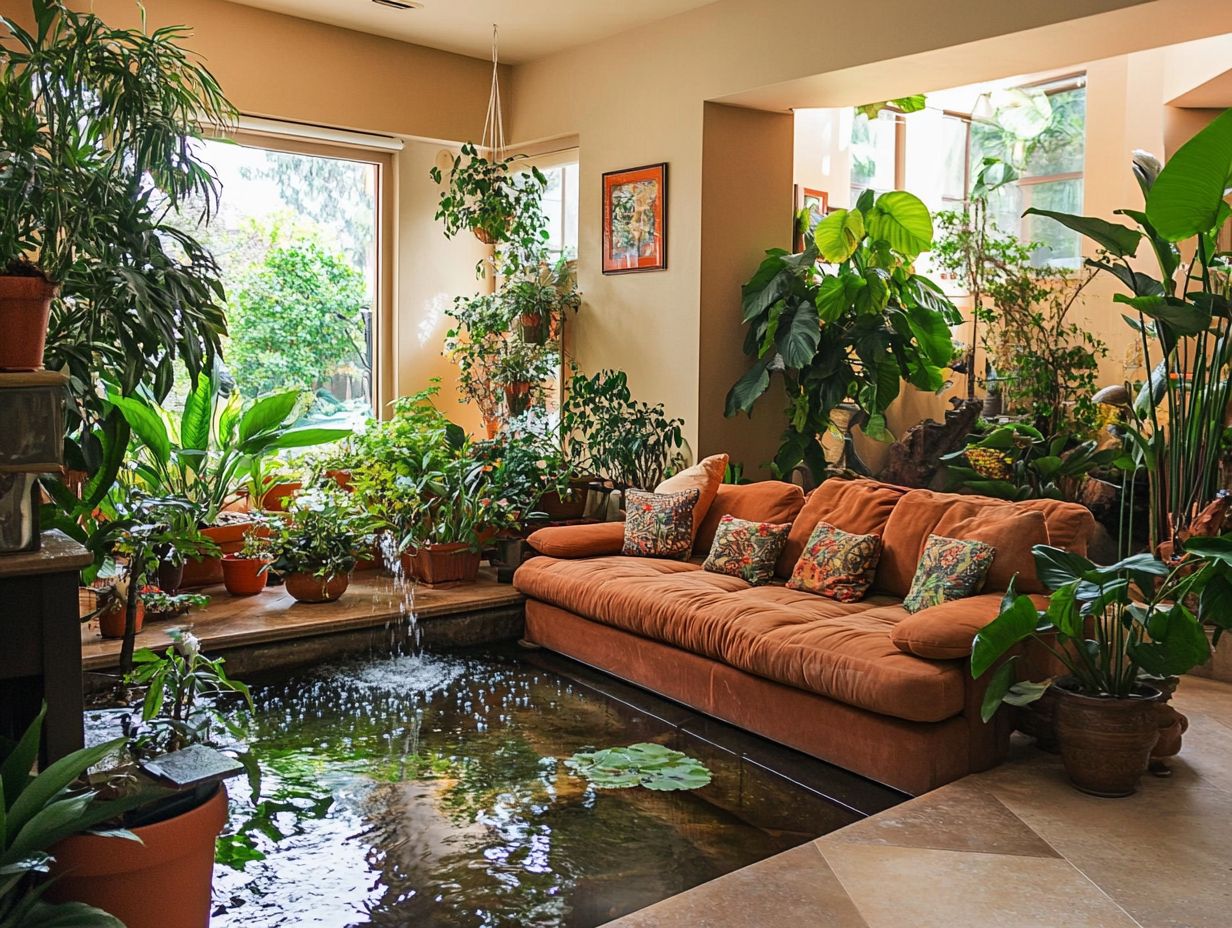
There are many indoor plants that are considered good for Feng Shui, such as the money tree, peace lily, lucky bamboo, and snake plant. These plants work wonders by attracting positive energy, purifying the air, and bringing good luck and abundance.
How can I incorporate indoor plants into my Feng Shui design?
You can incorporate indoor plants into your Feng Shui design by placing them in areas that correspond to the five elements of Feng Shui: wood, fire, earth, metal, and water.
Wood plants like bamboo should be placed in the east or southeast corner, representing growth and abundance.
Can indoor plants have a negative impact on Feng Shui?
Yes, indoor plants can negatively impact Feng Shui if they are placed in the wrong location or are not well-maintained. It s essential to consider the energy movement within your home environment.
For example, placing a dying plant in the wealth area can bring bad luck and draining energy instead of attracting abundance.
Are there specific care tips for indoor plants used in Feng Shui?
Yes, there are specific plant care tips for indoor plants used in Feng Shui. Keep indoor plants healthy and thriving. They represent vitality and positive energy.
The benefits of houseplants include improved air quality and enhanced creativity in your space. Avoid placing plants in the bedroom, as they can disrupt the flow of living energy and affect your sleep.
Can I use artificial plants instead of real ones for Feng Shui purposes?
While real plants are preferred for Feng Shui purposes, artificial plants can also be used as long as they are low maintenance and look realistic. However, they might not have the same visual appeal and benefits as live plants, so it is recommended to opt for real ones if possible.
Start your journey to a harmonious home today!

